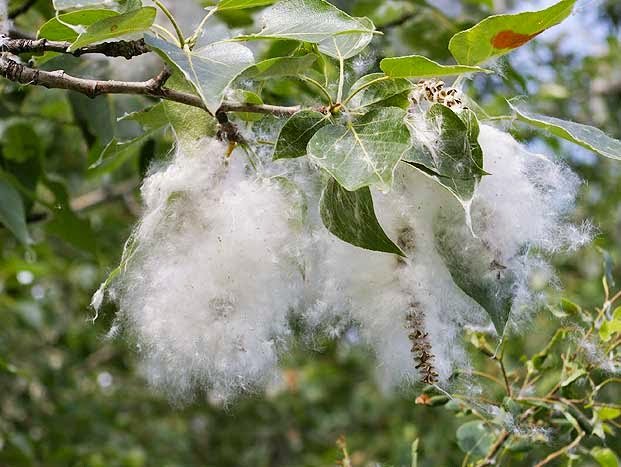Srinagar, May 15: Kashmir is witnessing a rise in annual pollen-related allergies as pollen produced by Russian poplars and other trees cloud the air amid the pollination season.
The pollen produced by the poplar, willow and other trees in May and June has triggered allergies with hospitals seeing rise in such cases with symptoms including throat infection, eye irritation, sneezing, and breathing difficulties, with children being particularly affected.
Doctors have advised people to take precautions due to the health risks associated with the pollen from Russian poplar trees, particularly during the pollination season.
“Every tree produces pollen. Russian poplar creates nuance as it generates visible pollen. The cotton-like material from these trees triggers allergies and respiratory issues,” said Dr Masood Rashid, Critical Care Expert with J&K Health department.
He said that people with compromised immune systems—such as those with bronchitis or allergic rhinitis—are more susceptible to pollen allergies.
“Pollen can aggravate the allergy and may lead to an infection. It is usually treated with anti-allergic medication and is not life-threatening,” he said.
Dr. Masood advised people, especially those affected by pollen and allergies, to take preventive measures such as wearing masks to reduce exposure. “Masks do help prevent pollen allergies,” he said.
The pollen has made life difficult as it affects the health of both children and adults, with the authorities nowhere to be seen regarding preventive measures.
“Every year as spring arrives Russian poplars start to produce cotton fluff into the air. Elderly and children are more prone to the infection. This leads to a substantial rise in the number of patients visiting hospitals,” said Ishfaq Ahmad, a Srinagar resident.
In 2015, the High Court had issued orders and asked the administration across the valley to cut down the Russian poplar trees, but little seems to be implemented on ground.
Despite High Court orders to axe the Russian poplars across the valley, district administrations in districts have failed to axe the banned poplar trees causing inconveniences and infections.
Due to the failure of the administration to cut down the poplar trees and its plantation, residents around these trees are facing severe health problems.
Parents of school going children have expressed serious concern over rising infections and allergies due to pollen dust. Presence of pollen in the air has forced many people to keep their children confined indoors.
“This pollen problem has engulfed many areas where the Russian poplars have been planted. The school-going children are the worst sufferers by it who develop complications due to this pollen dust,” Ghulam Mohammad, a parent.
The problem is worsening these days as these poplars are in full bloom with pollen dust.
“Many trees were producing a cotton-like substance, which caused immense problems. We approached the administration several times, but nothing was done. Eventually, we cut down these trees at the community level. The government must take responsibility and remove such trees,” said Javid Ahmad from Baramulla.
Residents from several other areas also questioned that if the High Court had ordered banning plantation of Russian poplars and asked to axe the poplars, then why is pollen everywhere.
Kashmir struggles to breathe as pollen clouds air
Allergy symptoms spike

Leave a Comment
Leave a Comment







